Deer hair loss syndrome Info
Home » Hair loss » Deer hair loss syndrome Info
Your Deer hair loss syndrome images are ready in this website. Deer hair loss syndrome are a topic that is being searched for and liked by netizens now. You can Get the Deer hair loss syndrome files here. Download all royalty-free vectors.
If you’re looking for deer hair loss syndrome images information connected with to the deer hair loss syndrome keyword, you have pay a visit to the right site. Our site frequently gives you hints for downloading the highest quality video and picture content, please kindly hunt and locate more informative video articles and graphics that match your interests.
Deer Hair Loss Syndrome. Many deer that display the syndrome one season apparently can survive to continue on. Hairloss syndrome is also associated with poor nutritional condition making it difficult for fawns to survive to replace the normal mortality in mature deer. Deer Hair-loss Syndrome Research pdf Clinical Signs. The syndrome is most common in black-tailed and Columbian white-tailed deer.
 Lice In Deer Northeast Wildlife Br Disease Cooperative From northeastwildlife.org
Lice In Deer Northeast Wildlife Br Disease Cooperative From northeastwildlife.org
Hair loss and yellow to white discoloration of hair over the ribcage flanks rump and neck. However if your continued monitoring reveals that an individual animal is suffering to the point of being close to expiration then I would urge you to contact your ODFW District Biologist again - They may need to remove the animal to avoid having the carcass act as an source of exposure for other deer. Little is known about the cause of the syndrome and its effect on black-tailed deer populations. Hairloss syndrome is also associated with poor nutritional condition making it difficult for fawns to survive to replace the normal mortality in mature deer. Deer Hair Loss Syndrome DHLS is called a syndrome not a disease because the cause and method of transmission are not completely understood. Among the 520 deer sampled 9 had hair loss and 45 were exotic louse-infested Table 2.
The syndrome is most common in black-tailed and Columbian white-tailed deer.
These deer were found near Svensen Ore. Deer licking excessively emaciation diarrhea lethargy and death. Found that HLS was caused by an exotic species of chewing providing information on fawn survival and cause-specific. Deer Hair Loss Syndrome DHLS is called a syndrome not a disease because the cause and method of transmission are not completely understood. Deer-hair loss syndrome occurs on both sides of the Columbia River. Hair loss syndrome HLS of black-tailed deer is caused by a heavy infestation of Eurasian lice first reported in Western Washington in 1995.
 Source: niwra.org
Source: niwra.org
In order to better characterize the condition 21 HLS-affected black-tailed deer BTD were necropsied and body condition parasite burdens and significant lesions were noted. At first a deer may have dark or almost black patches of hair but then the hair may turn yellow or white or the deer may have bare patches of skin. Many deer that display the syndrome one season apparently can survive to continue on. Darkening hair coat on the sides of the deer. Deer Hair Loss Syndrome DHLS is called a syndrome not a disease because the cause and method of transmission are not completely understood.
 Source: northeastwildlife.org
Source: northeastwildlife.org
A widespread hair-loss syndrome HLS has affected Columbian black-tailed deer Odocoileus hemionus columbianus in western Oregon and Washington USA since. Deer with the syndrome usually show it in the winter as they begin removing the dark guard hair with their teeth revealing paler patches of underfur. The normal hosts of these lice are European and Asian deer and antelope which are not seriously affected by them. However if your continued monitoring reveals that an individual animal is suffering to the point of being close to expiration then I would urge you to contact your ODFW District Biologist again - They may need to remove the animal to avoid having the carcass act as an source of exposure for other deer. Hairloss syndrome is also associated with poor nutritional condition making it difficult for fawns to survive to replace the normal mortality in mature deer.
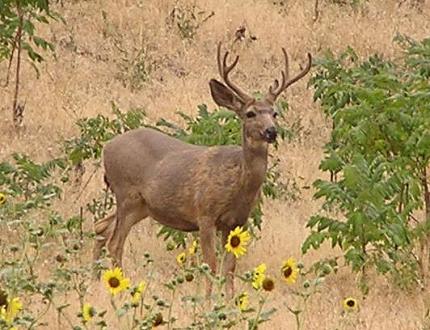 Source: wdfw.wa.gov
Source: wdfw.wa.gov
Exotic pediculosis and hair-loss syndrome in deer Odocoileus hemionus populations in California Infestation with nonnative exotic lice was first noted in Washington black-tailed deer Odocoileus hemionus columbianus in 1994 and has since then spread throughout the western United States. Specifically 63 of deer. In the later stages a deer can be very thin and lethargic with excessive loss of hair according to the. Hair Loss Syndrome caused by exotic lice Hair loss syndromeHLS of black-tailed deer was first described in Washington in 1995. What is Deer Hair Loss Syndrome.
 Source: belgraviacentre.com
Source: belgraviacentre.com
Deer with the syndrome usually show it in the winter as they begin removing the dark guard hair with their teeth revealing paler patches of underfur. The normal hosts of these lice are European and Asian deer and antelope which are not seriously affected by them. The normal hosts of this louse are non-native deer and. In the later stages a deer can be very thin and lethargic with excessive loss of hair according to the. Hair loss syndrome HLS of black-tailed deer is caused by a heavy infestation of Eurasian lice first reported in Western Washington in 1995.
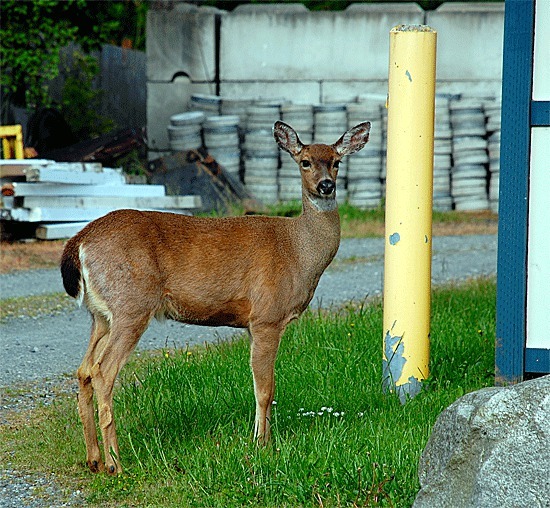 Source: whidbeynewstimes.com
Source: whidbeynewstimes.com
A widespread hair-loss syndrome HLS has affected Columbian black-tailed deer Odocoileus hemionus columbianus in western Oregon and Washington USA since. A widespread hair-loss syndrome HLS has affected Columbian black-tailed deer Odocoileus hemionus columbianus in western Oregon and Washington USA since 1996. Hair Loss Syndrome caused by exotic lice Hair loss syndromeHLS of black-tailed deer was first described in Washington in 1995. Deer hair loss syndrome DHLS causes a deer to lose its hair for unknown reasons. The normal hosts of these lice are European and Asian deer and antelope which are not seriously affected by them.
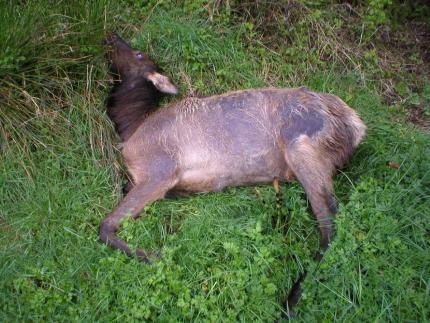 Source: wdfw.wa.gov
Source: wdfw.wa.gov
Deer hair loss syndrome DHLS causes a deer to lose its hair for unknown reasons. A widespread hair-loss syndrome HLS has affected Columbian black-tailed deer Odocoileus hemionus columbianus in western Oregon and Washington USA since 1996. Deer Hair Loss Syndrome DHLS is called a syndrome not a disease because the cause and method of transmission are not completely understood. Bill Wagner The Daily News By Allen Thomas The Vancouver Columbian Hair-loss. Found that HLS was caused by an exotic species of chewing providing information on fawn survival and cause-specific.
Source:
Among the 520 deer sampled 9 had hair loss and 45 were exotic louse-infested Table 2. At first a deer may have dark or almost black patches of hair but then the hair may turn yellow or white or the deer may have bare patches of skin. Among the 520 deer sampled 9 had hair loss and 45 were exotic louse-infested Table 2. Hair loss syndrome HLS of black-tailed deer is caused by a heavy infestation of Eurasian lice first reported in Western Washington in 1995. It is seen in mostly young deer especially does and is.
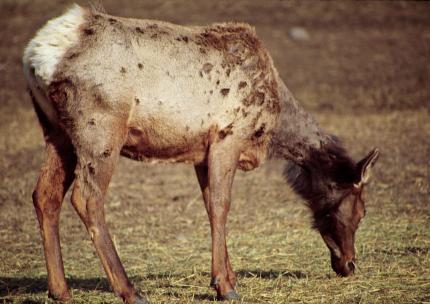 Source: wdfw.wa.gov
Source: wdfw.wa.gov
Deer Hair Loss Syndrome DHLS is called a syndrome not a disease because the cause and method of transmission are not completely understood. Deer Hair Loss Syndrome DHLS is called a syndrome not a disease because the cause and method of transmission are not completely understood. Hair loss syndrome HLS of black-tailed deer is caused by a heavy infestation of Eurasian lice first reported in Western Washington in 1995. Deer-hair loss syndrome occurs on both sides of the Columbia River. Little is known about the cause of the syndrome and its effect on black-tailed deer populations.
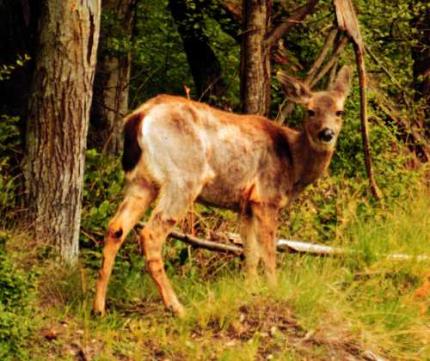 Source: wdfw.wa.gov
Source: wdfw.wa.gov
Little is known about the cause of the syndrome and its effect on black-tailed deer populations. It is characterized by a severe infestation of an exotic chewing louse Damalinia sp general decline in body condition hair loss especially over the thorax flanks and hindquarters morbidity mortality and excessive grooming behavior. The normal hosts of these lice are European and Asian deer and antelope which are not seriously affected by them. It is seen in mostly young deer especially does and is. Deer Hair Loss Syndrome DHLS is called a syndrome not a disease because the cause and method of transmission are not completely understood.
 Source: pamperingcampers.wordpress.com
Source: pamperingcampers.wordpress.com
Hair loss syndrome HLS of black-tailed deer is caused by a heavy infestation of Eurasian lice first reported in Western Washington in 1995. What is Deer Hair Loss Syndrome. Tailed deer recruitment in Washington is hair loss syndrome acknowledged the need to clarify factors limiting black-tailed Washington Bender and Hall 2004. During 20062009 we captured 228 fawns on the Olympic Peninsula Washington USA to determine sources of fawn mortality estimate survival rates identify factors influencing survival rates assess the influence of hair loss syndrome HLS on winter survival and estimate population growth. Deer with the syndrome usually show it in the winter as they begin removing the dark guard hair with their teeth revealing paler patches of underfur.
 Source: pamperingcampers.wordpress.com
Source: pamperingcampers.wordpress.com
The normal hosts of this louse are non-native deer and. Deer hair loss syndrome DHLS causes a deer to lose its hair for unknown reasons. It is seen in mostly young deer especially does and is. The normal hosts of this louse are non-native deer and. Little is known about the cause of the syndrome and its effect on black-tailed deer populations.
Source:
Hair loss and yellow to white discoloration of hair over the ribcage flanks rump and neck. A widespread hair-loss syndrome HLS has affected Columbian black-tailed deer Odocoileus hemionus columbianus in western Oregon and Washington USA since 1996. At first a deer may have dark or almost black patches of hair but then the hair may turn yellow or white or the deer may have bare patches of skin. The condition is caused by a heavy infestation with a Eurasian louse of poorly defined taxonomic status in the genus Damalinia Cervicola sp. It is characterized by a severe infestation of an exotic chewing louse Damalinia sp general decline in body condition hair loss especially over the thorax flanks and hindquarters morbidity mortality and excessive grooming behavior.
 Source: tdn.com
Source: tdn.com
Many deer that display the syndrome one season apparently can survive to continue on. Deer-hair loss syndrome occurs on both sides of the Columbia River. Hairloss syndrome is also associated with poor nutritional condition making it difficult for fawns to survive to replace the normal mortality in mature deer. A widespread hair-loss syndrome HLS has affected Columbian black-tailed deer Odocoileus hemionus columbianus in western Oregon and Washington USA since 1996. The condition is caused by a heavy infestation with a Eurasian louse of poorly defined taxonomic status in the genus Damalinia Cervicola sp.
 Source: dfw.state.or.us
Source: dfw.state.or.us
The normal hosts of these lice are European and Asian deer and antelope which are not seriously affected by them. The normal hosts of these lice are European and Asian deer and antelope which are not seriously affected by them. Found that HLS was caused by an exotic species of chewing providing information on fawn survival and cause-specific. The condition is caused by a heavy infestation with a Eurasian louse of poorly defined taxonomic status in the genus Damalinia Cervicola sp. During 20062009 we captured 228 fawns on the Olympic Peninsula Washington USA to determine sources of fawn mortality estimate survival rates identify factors influencing survival rates assess the influence of hair loss syndrome HLS on winter survival and estimate population growth.
 Source: calwil.wordpress.com
Source: calwil.wordpress.com
Exotic pediculosis and hair-loss syndrome in deer Odocoileus hemionus populations in California Infestation with nonnative exotic lice was first noted in Washington black-tailed deer Odocoileus hemionus columbianus in 1994 and has since then spread throughout the western United States. Hair loss syndrome HLS of black-tailed deer is caused by a heavy infestation of Eurasian lice first reported in Western Washington in 1995. Hair loss and yellow to white discoloration of hair over the ribcage flanks rump and neck. However if your continued monitoring reveals that an individual animal is suffering to the point of being close to expiration then I would urge you to contact your ODFW District Biologist again - They may need to remove the animal to avoid having the carcass act as an source of exposure for other deer. A widespread hair-loss syndrome HLS has affected Columbian black-tailed deer Odocoileus hemionus columbianus in western Oregon and Washington USA since.
Source:
Later in the winter and into the spring. Common symptoms include yellow or white appearing hair or bare patches of skin. Specifically 63 of deer. In the later stages a deer can be very thin and lethargic with excessive loss of hair according to the. The normal hosts of this louse are non-native deer and.
Source:
Tailed deer recruitment in Washington is hair loss syndrome acknowledged the need to clarify factors limiting black-tailed Washington Bender and Hall 2004. Deer licking excessively emaciation diarrhea lethargy and death. Exotic pediculosis and hair-loss syndrome in deer Odocoileus hemionus populations in California Infestation with nonnative exotic lice was first noted in Washington black-tailed deer Odocoileus hemionus columbianus in 1994 and has since then spread throughout the western United States. Common symptoms include yellow or white appearing hair or bare patches of skin. Many deer that display the syndrome one season apparently can survive to continue on.
Source:
Exotic pediculosis and hair-loss syndrome in deer Odocoileus hemionus populations in California Infestation with nonnative exotic lice was first noted in Washington black-tailed deer Odocoileus hemionus columbianus in 1994 and has since then spread throughout the western United States. Exotic pediculosis and hair-loss syndrome in deer Odocoileus hemionus populations in California Infestation with nonnative exotic lice was first noted in Washington black-tailed deer Odocoileus hemionus columbianus in 1994 and has since then spread throughout the western United States. The normal hosts of this louse are non-native deer and. However if your continued monitoring reveals that an individual animal is suffering to the point of being close to expiration then I would urge you to contact your ODFW District Biologist again - They may need to remove the animal to avoid having the carcass act as an source of exposure for other deer. In the later stages a deer can be very thin and lethargic with excessive loss of hair according to the.
This site is an open community for users to submit their favorite wallpapers on the internet, all images or pictures in this website are for personal wallpaper use only, it is stricly prohibited to use this wallpaper for commercial purposes, if you are the author and find this image is shared without your permission, please kindly raise a DMCA report to Us.
If you find this site helpful, please support us by sharing this posts to your favorite social media accounts like Facebook, Instagram and so on or you can also bookmark this blog page with the title deer hair loss syndrome by using Ctrl + D for devices a laptop with a Windows operating system or Command + D for laptops with an Apple operating system. If you use a smartphone, you can also use the drawer menu of the browser you are using. Whether it’s a Windows, Mac, iOS or Android operating system, you will still be able to bookmark this website.

Category
Related By Category
- Kenalog for hair loss Information
- Does wearing wigs cause hair loss Info
- Klorane anti hair loss treatment review Info
- Chris brown hair loss Resolve
- Salman khan hair loss Info
- Hair extensions for hair loss Info
- Black men hair loss Information
- Hair loss ads Information
- Ds hair loss treatment Info
- Pantene hair loss treatment Resolve
